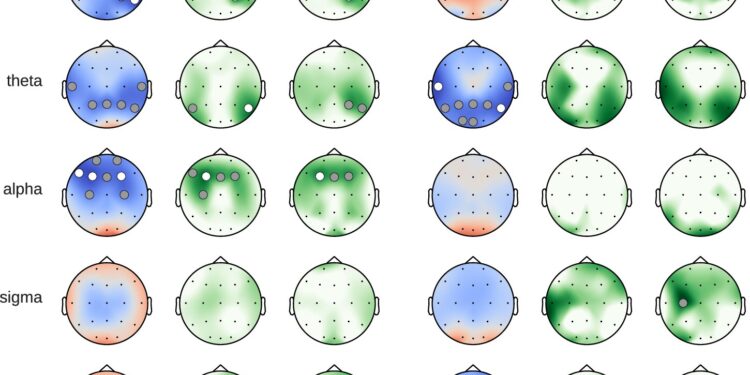Brain activity models during sleep (Nrem and Rem), comparing the effects of caffeine compared to placebo on periodic neural oscillations (after eliminating the aperiodic spectral components). Credit: Communications biology (2025). DOI: 10.1038 / S42003-025-08090-Z
Caffeine is not only in coffee, but also in tea, chocolate, energy drinks and many soft drinks, making it one of the most consumed psychoactive substances in the world.
In a study published in Communications biologyA team of researchers from the University of Montreal has given new light on how caffeine can change sleep and influence brain recovery – both physical and cognitive – one night.
The research was led by Philipp Thölke, a research trainee at the Udem (Coco Lab) cognitive and computer neuroscience laboratory, and co -directed by the laboratory director, Karim Jerbi, professor and researcher at Mila – Quebec AI.
Working with the professor of sleep psychology, Julie Carrier and her team at the Udem’s Center for Advanced Research in Sleep Medicine, the scientists used AI and electroencephalography (EEG) to study the effect of caffeine on sleep.
They have shown for the first time that caffeine increases the complexity of brain signals and improves the “criticality” of the brain during sleep. Interestingly, it was more pronounced in young adults.
“Criticality describes a state of the brain which is balanced between order and chaos,” said Jerbi. “It’s like an orchestra: too calm and nothing happens, too chaotic and there is cacophony. Criticality is the joyful environment where brain activity is both organized and flexible. In this state, the brain works optimally: it can effectively process information, adapt quickly, learn and make decisions with agility.”
Carrier added: “Caffeine stimulates the brain and grows it in a state of criticality, where it is more awake, alert and reactive. Although this is useful during the concentration day, this state could interfere with rest at night; the brain would not relax or recover correctly.”
40 adults have studied
To study how caffeine affects the sleeping brain, Carrier’s team recorded the night brain of 40 healthy adults using an electroencephalogram. They compared the brain activity of each participant on two distinct nights, one when they consumed caffeine capsules three hours, then an hour before bedtime, and another when they took a place at the same time.
“We used an advanced statistical analysis and an artificial intelligence to identify the subtle changes in neural activity,” said Thölke, the first author of the study. “The results have shown that caffeine increases the complexity of brain signals, reflecting a more dynamic and less predictable neuronal activity, in particular during the sleep phase of the non -rapid eye movement (NREM) which is crucial for the consolidation of memory and cognitive recovery.”
The researchers also discovered striking changes in the electrical rhythms of the brain during sleep: caffeine attenuated slower oscillations such as Thêtaises and Alpha waves – generally associated with sleep deeply and sleep – and stimulated the activity of beta waves, which is more common during awakening and mental commitment.
“These changes suggest that even during sleep, the brain remains in a more activated and less restorative state under the influence of caffeine,” explains Jerbi, who also holds the research president of Canada in computer neuroscience and cognitive neuroimperie. “This change in the rhythmic activity of the brain can help to explain why caffeine affects the effectiveness with which the brain is recovered during the night, with potential consequences for the treatment of memory.”
People in their twenties more affected
The study also showed that the effects of caffeine on brain dynamics were significantly more pronounced in young adults aged 20 to 27 compared to middle ages aged 41 to 58, in particular during paradoxical sleep, the phase associated with the dream.
Young adults have shown a greater response to caffeine, probably due to a higher density of adenosine receptors in their brain. Adenosine is a molecule that gradually accumulates in the brain throughout the day, causing a feeling of fatigue.
“Adenosine receptors naturally decrease with age, reducing caffeine’s ability to block them and improve the complexity of the brain, which may partly explain the reduced effect of caffeine observed in middle age participants,” said Carrier.
These age -related differences suggest that younger brains can be more sensitive to the stimulating effects of caffeine. Given the widespread use of caffeine in the world, especially as a daily remedy for fatigue, researchers highlight the importance of understanding its complex effects on brain activity in different age groups and health conditions.
They add that additional research is necessary to clarify how these neural changes affect cognitive health and daily operation, and to potentially guide personalized recommendations for caffeine intake.
More information:
Philipp Thölke et al, caffeine induces an increase dependent on the age of the complexity of the brain and criticality during sleep, Communications biology (2025). DOI: 10.1038 / S42003-025-08090-Z
Supplied by the University of Montreal
Quote: How coffee affects a sleeping brain (2025, May 28) recovered on May 29, 2025 from
This document is subject to copyright. In addition to any fair program for private or research purposes, no part can be reproduced without written authorization. The content is provided only for information purposes.



